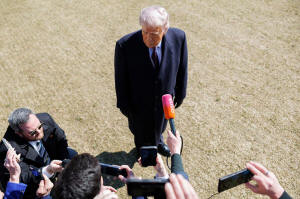Trump raises the possibility of a ‘friendly takeover of Cuba’ coming out
of talks with Havana
[February 28, 2026]
By WILL WEISSERT
WASHINGTON (AP) — President Donald Trump said Friday that the U.S. is in
talks with Havana and raised the possibility of a “friendly takeover of
Cuba” without offering any details on what he meant.
Speaking to reporters outside the White House as he left for a trip to
Texas, Trump said Secretary of State Marco Rubio was in discussions with
Cuban leaders “at a very high level.”
“The Cuban government is talking with us,” the president said. “They
have no money. They have no anything right now. But they’re talking to
us, and maybe we’ll have a friendly takeover of Cuba.”
He added: “We could very well end up having a friendly takeover of
Cuba.”
Trump didn't clarify his comments but seemed to indicate that the
situation with Cuba, a communist-run island that has been among
Washington’s bitterest adversaries for decades, was coming to a critical
point. The White House did not respond to requests for more information
Friday.
The president also said that Cuba “is, to put it mildly, a failed
nation” and "they want our help.”
His remarks came two days after the Cuban government reported that a
Florida-registered speedboat carrying 10 armed Cubans from the U.S.
opened fire on soldiers off the island’s north coast. Four of the armed
Cubans were killed, and six were injured in responding gunfire,
according to Cuba’s government. One Cuban official also was injured.
Cuba has been on Trump's mind since at least early January, after U.S.
forces ousted one of Havana’s closest allies, Venezuela’s socialist
President Nicolás Maduro. Trump suggested in the aftermath of that raid
that military action in Cuba might not be necessary because the island's
economy was weak enough — particularly in the absence of oil shipments
from Venezuela that stopped after Maduro was taken into custody — to
soon collapse on its own.

“We’ve had a lot of years of dealing with Cuba. I’ve been hearing about
Cuba since I’m a little boy. But they’re in big trouble,” he said
Friday.
Then, noting the exile community from the island living in the U.S.,
Trump said there could be something coming that “I think (is) very
positive for the people that were expelled, or worse, from Cuba and live
here.” He did not elaborate.
The U.S. has maintained a strict trade embargo on Cuba since 1962, the
year after a failed, CIA-sponsored invasion of the island at the Bay of
Pigs. Trump nonetheless indicated earlier this month that talks with
Cuban officials were underway.
[to top of second column]
|

President Donald Trump speaks to reporters before departing on
Marine One from the South Lawn of the White House, Friday, Feb. 27,
2026, in Washington. (AP Photo/Tom Brenner)

Cuba's government confirmed earlier this week that it was
communicating with U.S. officials following the shooting of the
American boat. Rubio has said the U.S. Department of Homeland
Security and Coast Guard are investigating what happened.
An executive order that Trump signed in late January pledged to
impose tariffs on countries providing oil to Cuba, threatening to
further cripple a country already plagued by a deepening energy
crisis, though U.S. authorities have since indicated that oil from
Venezuela can be sold to Cuban interests in some cases.
Carlos Fernández de Cossío, Cuba's deputy foreign minister, posted,
then later deleted on Friday that “the US maintains its fuel embargo
against Cuba in full force, and its impact as a form of collective
punishment is unwavering.”
“Nothing announced in recent days changes this reality,” he wrote on
X before the post was removed. “The possibility of conditional sales
to the private sector already existed and does not alleviate the
impact on the Cuban population.”
Meanwhile, 40-plus U.S. civil society organizations sent a letter to
Congress on Friday asking that it “press the Trump administration to
reverse its aggressive policy towards Cuba” and saying that efforts
to cut oil shipments to the Caribbean island would spark a
humanitarian collapse.
Signees included the Alliance of Baptists, ActionAid USA and the
Presbyterian Church.
“Policies that deliberately impose hunger and mass hardship on
millions of civilians constitute a form of collective punishment,
and as such are a grave violation of international humanitarian
law,” the letter reads.
___
Associated Press writer Dánica Coto contributed from San José, Costa
Rica.
All contents © copyright 2026 Associated Press. All rights reserved
 |